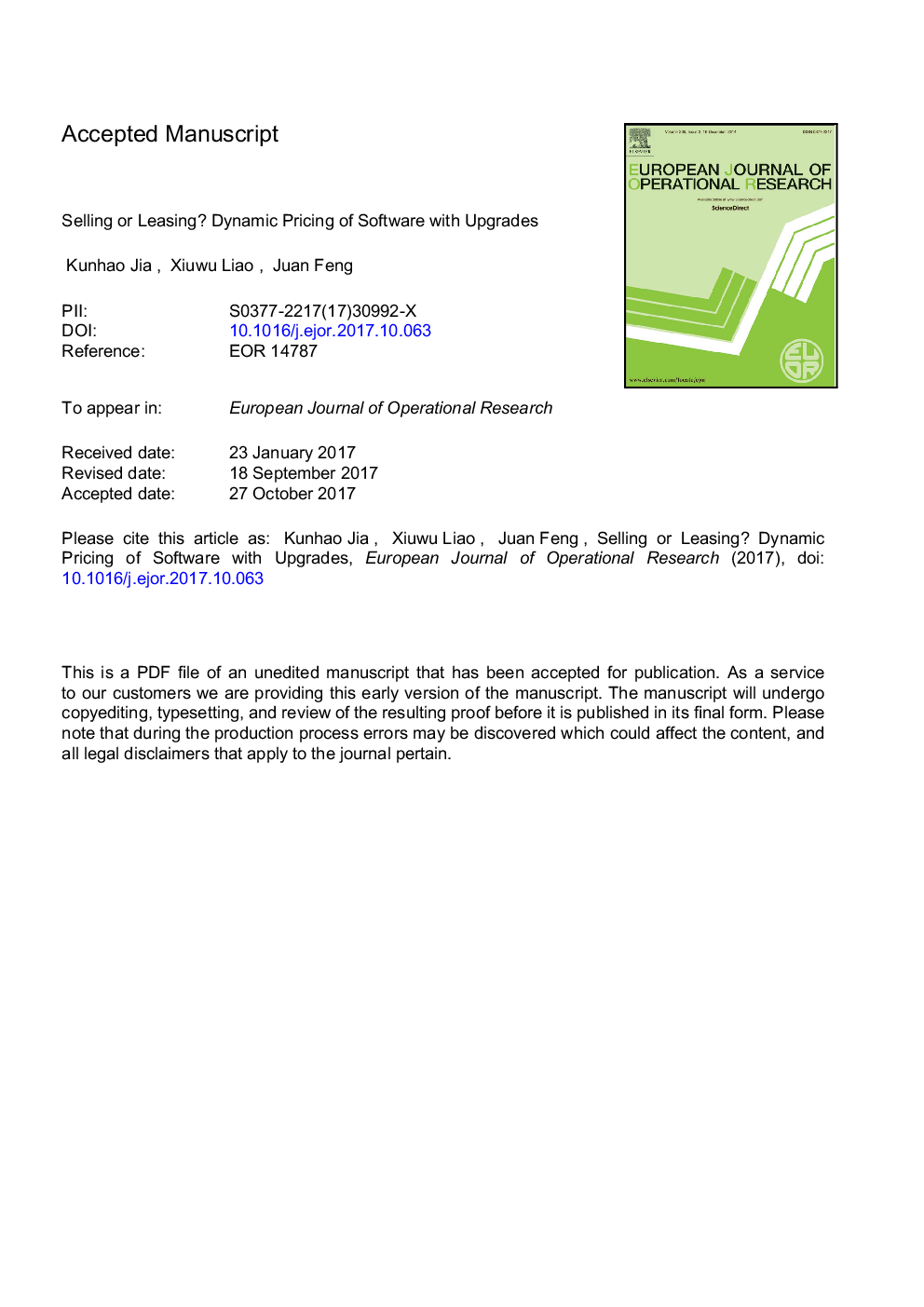| کد مقاله | کد نشریه | سال انتشار | مقاله انگلیسی | نسخه تمام متن |
|---|---|---|---|---|
| 6895123 | 1445937 | 2018 | 46 صفحه PDF | دانلود رایگان |
عنوان انگلیسی مقاله ISI
Selling or leasing? Dynamic pricing of software with upgrades
ترجمه فارسی عنوان
فروش یا اجاره قیمت گذاری پویا از نرم افزار با ارتقاء
دانلود مقاله + سفارش ترجمه
دانلود مقاله ISI انگلیسی
رایگان برای ایرانیان
کلمات کلیدی
قیمت گذاری، مجوز نرم افزار، فروش و اجاره، ارتقاء نرم افزار، تبعیض قیمت مبتنی بر رفتار،
ترجمه چکیده
در این مقاله، سودآوری یک مدل فروش و اجاره ای را با در نظر گرفتن ارتقاء نرم افزار و استراتژی های مختلف تقسیم قیمت در یک چارچوب مدل دو مرحلهای تحلیل می کنیم. سه استراتژی تبعیض قیمت در نظر گرفته شده است: بین زمان، مبتنی بر رفتار، و یک استراتژی تبعیض قیمت ترکیبی. ما متوجه می شویم که رفتار خرید بین دوره ای مصرف کننده و انتخاب یک فروشنده از استراتژی های تبعیض قیمت باعث می شود که مدل فروش بیشتر از مدل اجاره ای سود آور باشد. به طور خاص، اگر انحصارگر نمی تواند هرگز از اطلاعات مربوط به رفتار خرید قبلی مصرف کنندگان برای تبعیض قیمت استفاده نکند، مدل فروش سودآورتر از مدل اجاره است. ما همچنین می بینیم که اگر یک مدل فروش پذیرفته شود، انحصار باید راهبرد تبعیض قیمت مبتنی بر رفتار با پاداش برای بازگشت مصرف کنندگان را انتخاب کند؛ اما اگر یک مدل اجاره نامه اتخاذ شود، انحصار باید قیمت استراتژی تبعیض قیمت بین دوره ای را با قیمت روز افزون انتخاب کند. ما همچنین مدل ما را به یک بازار دووپلیت گسترش می دهیم. متفاوت از یک مورد انحصاری، ما دریافتیم که مدل فروش مدل تحت لیسانس تحت استراتژی ترکیبی غالب است، در حالی که این دو مدل تحت استراتژی بین زمانه سودآور هستند. این یافته ها بینش های جدیدی را در مقایسه با مدل های فروش و اجاره ارائه می دهد.
موضوعات مرتبط
مهندسی و علوم پایه
مهندسی کامپیوتر
علوم کامپیوتر (عمومی)
چکیده انگلیسی
In this paper, we analyze the profitability of a selling and a leasing model by considering both software upgrades and different price discrimination strategies in a two-period model framework. Three price discrimination strategies are considered: inter-temporal, behavior-based, and a hybrid price discrimination strategy. We find that consumers' inter-temporal purchase behaviors and a vendor's choice of price discrimination strategies make it possible for a selling model to be more profitable than a leasing model. More specifically, if the monopolist cannot commit to never using information about consumers' past purchase behavior for price discrimination, the selling model is more profitable than the leasing model. We also find that if a selling model is adopted, the monopolist should choose the behavior-based price discrimination strategy with a reward for returning consumers; but if a leasing model is adopted, the monopolist should choose the inter-temporal price discrimination strategy with a rising price. We also extend our model to a duopoly market. Different from a monopoly case, we find that the selling model dominates the leasing model under the hybrid strategy, while these two models are equally profitable under the inter-temporal strategy. These findings provide new insights into the comparison of the selling and leasing models.
ناشر
Database: Elsevier - ScienceDirect (ساینس دایرکت)
Journal: European Journal of Operational Research - Volume 266, Issue 3, 1 May 2018, Pages 1044-1061
Journal: European Journal of Operational Research - Volume 266, Issue 3, 1 May 2018, Pages 1044-1061
نویسندگان
Jia Kunhao, Liao Xiuwu, Feng Juan,
